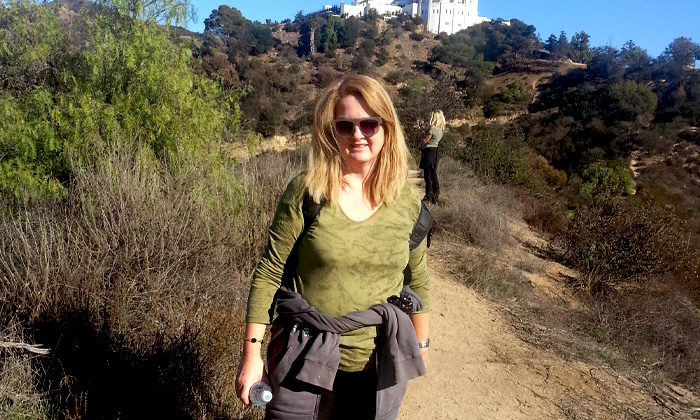Laura Foti Cohen—A Renaissance Woman in Contemporary Clothing
17 Jul 2014, Posted by in Advice for Aspiring Producers, Editorial Expertise, Marketing, social mediaLaura Foti Cohen started her career in book publishing, but found it moved too slowly for her. She then spent several years as a journalist for Audio Times and Billboard, covering audio technology at the dawn of the digital age, music video at the dawn of MTV and home video at the demise of the Betamax before leaving for a job in RCA Records’ video division. In 1987, she made the move from New York to Los Angeles and linear to interactive, joining Philips Media as Marketing Director, rising to Senior VP. Since 1996 she has run Sound Input, a marketing consulting practice now specializing in social media. She published her first book, The Cusp of Everything, in 2012; in 2013 she completed her first play, Wordly Possessions. She has recently written a one-woman show, which she will be performing at the Ebell of Los Angeles on October 8,014. If you want a laugh-out-loud evening, get tickets at
http://www.ebelleventtickets.com/2nd-Wednesdays-Reading-All-the-Wrong-Men-October-8-2014-0221.htm
- 1. You began your career in the music industry and home video. How and why did you make the switch to interactive media?
These days jobs at tech companies are in high demand, but this was not always the case. In the late ‘80s when I joined Philips, despite a strong technical grounding in other areas, I had never used a computer or even touched a mouse and had to be convinced to join a company whose product I didn’t fully understand. I was hired because my background in book publishing, music and home video mirrored the image Philips had for its new CD-Interactive system: my career was a melding of entertainment and information in the same way CD-I was being positioned as an all-encompassing consumer product.
- 2. Was the transition difficult? What do you wish you knew then that you know now?
The transition was eased by my extensive note-taking. Because Philips was not yet able to produce CD-Interactive when I joined the company, we had constant meetings, so in the early days I listened quietly, took notes and ate M&Ms. Today, those notes read more like a comic novel than a guide to getting by in new media, but they served their purpose. The M&Ms served theirs too.
What I wish I had known:
• Those who claim to know the most typically deliver the least.
• There is always more money than what you’ve been led to believe.
• The only person you really have to make happy is your boss. Besides, of course, yourself.
• Karma, baby. (Actually, I always suspected this but it’s been nice to have it confirmed over the years.)
• When going to work feels like being cast in a Bunuel film, it’s time to get out, even if the money is good.
- 3. Philips Media was a pioneer in the interactive industry. What was it like to be part of a group that was trying to create a new industry? What were the biggest challenges? What did that experience teach you about exploring unknown territory?
Oy, where to start? The challenges: The late, great Gordon Stulberg, our Chairman, used to describe our work as throwing parts of an airplane up into the air and trying to build and fly the plane simultaneously. In the early days the challenges were technical: there was no system to produce anything. In the middle, the challenges were creative: how did you design products that took advantage of interactivity but were also easy to use and could be developed within a reasonable budget for a specific audience? Being a part of the group that solved those problems was thrilling, and I have lifetime memories and friends (including you!) from the experience.
As for what it taught me: Of all the challenges, the challenge of marketing is perhaps the greatest, and the one over which you have the least control. You can’t control reviews, or your competition. You can’t always even foresee your competition. For example, our alleged “all things to all people” was in fact a limited, Read-Only product that never stood a chance against massively successful specialized products like video games and the true all-things-to-all-people invention, The Web.
When going to work feels like being cast in a Bunuel film, it’s time to get out, even if the money is good.
- 4. What are you most proud of in terms of career accomplishment?
The writing I’m doing now, which is informed by the knowledge I built throughout my career.
- 5. We call this blog, Influences and Influencers, who are the people who have influenced you? Have you ever had a mentor? Can you tell us about him or her? Whose work or input has impacted you the most in your career and how?
I can’t say I’ve ever had a mentor. There have certainly been people I’ve admired and tried to learn from and emulate, but not in any codified way. Of course, there are also the bad examples, the cautionary tales which may have been even more valuable influences.
That said, I always greatly admired Katherine Graham for stepping up and making the Washington Post a juggernaut when she could easily have taken the safe route. For being a powerful woman in what then was truly a man’s world. And I’d have to say my greatest influence was Nora Ephron. I used to wait for the new issue of Esquire to read her column in the ‘70s, and she went on to write brilliantly in other media. In this post-corporate phase of my life I aspire to write at her level of warmth, cynicism, insight and humor.
- 6. What is the most surprising result you experienced in your career? For example, is there a product you intended for one demographic that turned out to be more appropriate for a completely different one? Was there a product you thought was a sure winner that bombed? What did you learn from this experience?
My career has been one long extended series of surprises. I was surprised to learn how textbooks were made, less than a year after overpaying for them. I was surprised every time an issue of a magazine I worked on actually showed up in print on my desk, and at the impact their articles could have – especially an editorial I wrote for Billboard calling MTV racist and sexist. I was surprised at just how disgusting the music industry, and especially music video, really was. Truly, you don’t want to know how that sausage is made.
Because I had drunk the CD-I Kool-Aid, the massive shift over the past two decades away from the mass market and toward ever-narrowing niches also took me by surprise. It’s a rare product/show that reaches the mainstream anymore, but I have learned to embrace this in both my writing and my social media work.
I was surprised that sadists get paid so much more than masochists, although in retrospect that should have been a gimme. I’ve learned to avoid sadists and that I will never be a masochist.
- 7. What product or service have you seen lately that really excites you?
I’m a huge fan of Spotify and use Waze whenever I have to get on the 10. And, having done research into voice recognition 30 years ago, I’m thrilled whenever my Android actually understands what I say and turns it into a text message. (Unfortunately, it usually means I have to switch to the keyboard to get rid of a bunch of gibberish. Maybe in another 30 years…)
- 8. What are you working on now?
I’ve been doing lots of tweeting for clients and love editing down, down, down to get to the kernel of truth. .On the creative side I’m loving writing my second play, which is based in the tech world, and getting ready for my first show.
- 9. How has social media impacted the work you do? Do you feel it is easier or harder to get the word out on a new product?
Both. Easier to put something out there, harder to break through the noise. You have to be witty and insightful 24/7. It’s exhausting.
- 10. If you could start all over again, what career would you pursue? Why?
I don’t have any regrets about my career except that stint at the record company. The only thing I would change would be to have embraced technology earlier and oftener. I’m sorry I wasn’t confident enough in my own knowledge to have some lucrative start-ups behind me by now.






Knowing you both, knowing how smart you both are, and sharing many of these experiences I so enjoyed this interview, and I “hear” your voices in these words. In reflection it would be wonderful if Laura published her long-threatened book on an insider’s perspective of a failed technology and flawed venture.
The copious notes Laura took during those heady days of interactive optical technology surely contain a tale that would serve future bright-eyed bushy tailed (and well-intentioned) technologists!
Mark, I have dug the archives out of the garage and am enjoying going through them. What a time we had! Cogitating about the optimal format to share the fabulous stories.
Great interview! Can’t wait to see Laura’s one-woman show.